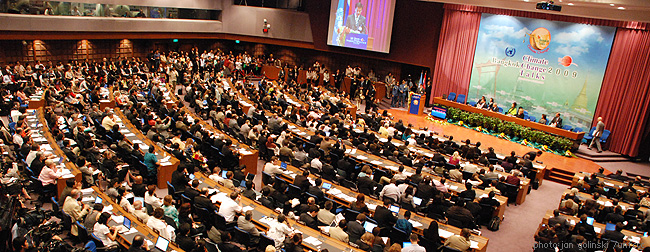…and we’re off to a crawl
cross posted from Grist.
Coming right off the heels of the UN General Assembly in New York and the G20 in Pittsburgh, the world has taken its next step on the road to Copenhagen: the Bangkok round of negotiations for the United Nations Framework Convention on Climate Change (UNFCCC).
This morning the Thai Prime Minister opened the session by saying “There is no plan B, if we do not realize plan A, we go straight to plan F, which stands for failure.”
So, no pressure.

With an invigorated sense of skepticism, civil society, governments, and of course business interests are here to try to hammer through obtuse and contradictory text to create something that can be of some use on the table at the Copenhagen meetings this December.
The UN press office was quick to hand me a defensive-sounding media release stating ‘Negotiations set to pick up in Bangkok as a result of New York Climate Change Summit’ – hoping to put a positive spin on the process. Sure, the New York summit yielded lots of big talk about Climate – unfortunately very little in the way of meaningful targets and commitments, as pointed out (to much applause) by a Sudanese delegate this morning.
The reality of the US being able to meaningfully commit is grim, as illustrated by the statement released by John Podesta and Rajendra Pachauri, this Friday. Despite Obama talking a good game (which in itself is a welcome departure from the Bush years), he still failed to put forward any details. Hopes previously pinned on Obama have been deflated by stalled domestic legislation that NASA’s Dr. James Hansen said, if implemented “would do more harm to the environment than nothing at all.”
On the flip side, many people here in Bangkok have been encouraged by China’s announcement at the NY summit that it is increasing commitments on carbon reduction. We all know though, that responsibility to lead with these negotiations lies on the global North to make bolder and serious commitments. India and China are moving, and the classic US approach trying to pin blame on them is increasingly seen as excuse-mongering even to those who may have bought the line before.
From where we stand now, it looks like Copenhagen will be a greenwash. But civil society here in Bangkok is not taking this as a moment to despair but as a higher call to action for just and equitable mechanisms to meet meaningful targets. Peoples movements and activist networks from across the globe are taking this opportunity to build and organize, invigorating local solutions back home, regardless of what ends up on the negotiating table. And so we keep pushing. If we temper our ambition along with our expectations, governments will feel more emboldened to backslide and allow the treaty to be an industry giveaway. Lets keep pressure up.
Here’s an inspiring quickie of organizers in the United States working for community based solutions to the climate crisis:
[youtube 0eOnvS8pxAU]